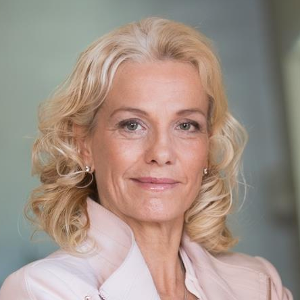
08 Nov Interview with Pamela Munster of UCSF

Dr. Munster is a physician scientist who received her medical degree from the University of Bern, Switzerland. She completed her medical training at Indiana University Medical Center and Memorial Sloan-Kettering Cancer Center, New York where she then served on faculty as a breast cancer specialist prior to moving to the University of California, San Francisco, where she is Professor in Residence and Program Leader for the Experimental Therapeutics Program, as well as the Co-Leader of the Center for BRCA Research at Helen Diller Family Comprehensive Cancer Center. Her laboratory develops novel targeted cancer treatment strategies. Read her full bio.
Interview with Pamela Munster of UCSF
Q: The Nobel Price in Medicine was awarded recently to James Allison and Tasuku for their work on unleashing the body’s immune system to attack cancer, a breakthrough that has led to an entirely new class of drugs and brought lasting remissions to many patients who had run out of options. The Nobel committee hailed their accomplishments as establishing “an entirely new principle for cancer therapy.” What is your first-hand experience the impact that those new drugs had on patients?
A: Immunotherapy has completely changed the lives of many patients with melanoma, lung cancer and other type of cancers with tumors that have historically been difficult to treat. Many other tumors are not as readily responsive to IO or are immune cold or immune silent tumors. Much effort is underway to find how to use immunotherapy approaches for such cancers.
Q: What the next generation of immune therapies will look like for cancer?
A: The goals of immunotherapy like any other therapy is to exploit vulnerabilities of tumors, at late stages as well as in early stage. The next advances will come from synergistic interaction of immunotherapy with other immune therapeutics, combinations with chemotherapy and other targeted therapies and the definition of highly susceptible and restricted targets as biomarkers.
Q: The checkpoint inhibitors and CAR-T therapies now on the market have only been approved for some cancer types, and benefit only a small subset of those patients. What do you project the role of immunotherapy in cancer care will be ten years from now?
A: Hopefully, immunotherapy will be integrated into earlier stage tumors and further advances in vaccines and similar approaches will provide novel opportunities in the prevention of cancer. Over the next few years we will learn more about who will benefit from specific immune therapies, when and how long to treat them. I personally hope that we can leverage environmental and life style factors (e.g. sleep and exercise) to further boost immune responses in the treatment and prevention of cancer.
Q: Approved immunotherapy drugs have severe side effects, turning the fury of the immune system against the patient own healthy cells, and they are expensive, costing more than $100,000 a year. Do you expect any of those to change in the near future?
A: Major efforts are directed to better define optimal risk and benefit ratios to justify cost and avoid side effects in those with only marginal benefit from immunotherapy.
Q: Is there anything you would like to share with the PMWC audience?
A: This is an incredibly exciting time in oncology with many novel groundbreaking discoveries in the treatment of advanced cancer, but it is also a time to expand our efforts and engage the immune system into the prevention of cancer in addition to a continued focus on those with advanced cancer.






